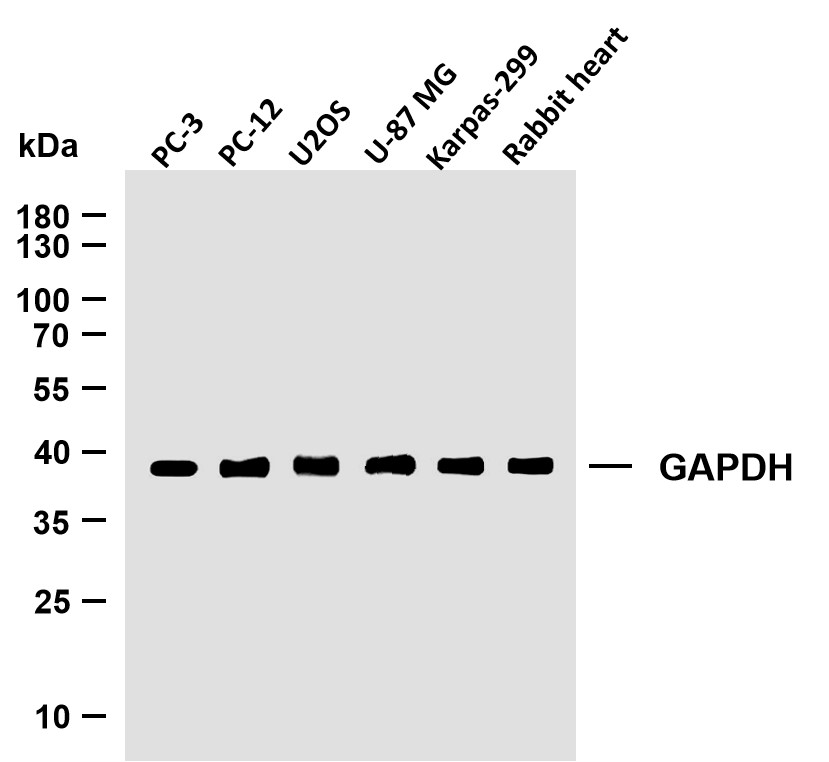
Catalog: YM6877
Size
Price
Status
Qty.
200μL
$600.00
In stock
0
100μL
$340.00
In stock
0
40μL
$190.00
In stock
0
Add to cart


Collected


Collect
Main Information
Target
GFAP
Host Species
Mouse
Reactivity
Human, Rat, Monkey, Bovine
Applications
IHC, ELISA
MW
49kD (Calculated)
50kD (Observed)
Conjugate/Modification
Unmodified
Detailed Information
Recommended Dilution Ratio
IHC 1:200-400; ELISA 1:500-5000
Formulation
PBS, 50% glycerol, 0.05% Proclin 300, 0.05%BSA
Specificity
The antibody can specifically recognize human GFAP protein.
Purification
The antibody was affinity-purified from ascites by affinity-chromatography using specific immunogen.
Storage
-15°C to -25°C/1 year(Do not lower than -25°C)
MW(Calculated)
49kD
MW(Observed)
50kD
Modification
Unmodified
Clonality
Monoclonal
Clone Number
ABT176
Isotype
IgG2b,Kappa
Related Products
Antigen&Target Information
Immunogen:
Synthesized peptide derived from human GFAP AA range: 300-432
show all
Specificity:
The antibody can specifically recognize human GFAP protein.
show all
Gene Name:
GFAP
show all
Protein Name:
GFAP
show all
Other Name:
Glial fibrillary acidic protein ;
GFAP ;
GFAP ;
show all
Background:
This gene encodes one of the major intermediate filament proteins of mature astrocytes. It is used as a marker to distinguish astrocytes from other glial cells during development. Mutations in this gene cause Alexander disease, a rare disorder of astrocytes in the central nervous system. Alternative splicing results in multiple transcript variants encoding distinct isoforms. [provided by RefSeq, Oct 2008],
show all
Function:
Alternative products:Isoforms differ in the C-terminal region which is encoded by alternative exons,Disease:Defects in GFAP are a cause of Alexander disease (ALEXD) [MIM:203450]. Alexander disease is a rare disorder of the central nervous system. It is a progressive leukoencephalopathy whose hallmark is the widespread accumulation of Rosenthal fibers which are cytoplasmic inclusions in astrocytes. The most common form affects infants and young children, and is characterized by progressive failure of central myelination, usually leading to death usually within the first decade. Infants with Alexander disease develop a leukoencephalopathy with macrocephaly, seizures, and psychomotor retardation. Patients with juvenile or adult forms typically experience ataxia, bulbar signs and spasticity, and a more slowly progressive course.,Function:GFAP, a class-III intermediate filament, is a cell-specific marker that, during the development of the central nervous system, distinguishes astrocytes from other glial cells.,online information:GFAP entry,similarity:Belongs to the intermediate filament family.,subcellular location:Associated with intermediate filaments.,subunit:Interacts with SYNM (By similarity). Isoform 3 interacts with PSEN1 (via N-terminus).,tissue specificity:Expressed in cells lacking fibronectin.,
show all
Cellular Localization:
Cytoplasmic
show all
Tissue Expression:
Research Areas:
>>JAK-STAT signaling pathway
show all
Signaling Pathway
Reference Citation({{totalcount}})
Catalog: YM6877
Size
Price
Status
Qty.
200μL
$600.00
In stock
0
100μL
$340.00
In stock
0
40μL
$190.00
In stock
0
Add to cart


Collected


Collect
Recently Viewed Products
Clear allPRODUCTS
CUSTOMIZED
ABOUT US
Toggle night Mode
{{pinfoXq.title || ''}}
Catalog: {{pinfoXq.catalog || ''}}
Filter:
All
{{item.name}}
{{pinfo.title}}
-{{pinfo.catalog}}
Main Information
Target
{{pinfo.target}}
Reactivity
{{pinfo.react}}
Applications
{{pinfo.applicat}}
Conjugate/Modification
{{pinfo.coupling}}/{{pinfo.modific}}
MW (kDa)
{{pinfo.mwcalc}}
Host Species
{{pinfo.hostspec}}
Isotype
{{pinfo.isotype}}
Product {{index}}/{{pcount}}
Prev
Next
{{pvTitle}}
Scroll wheel zooms the picture
{{pvDescr}}




















